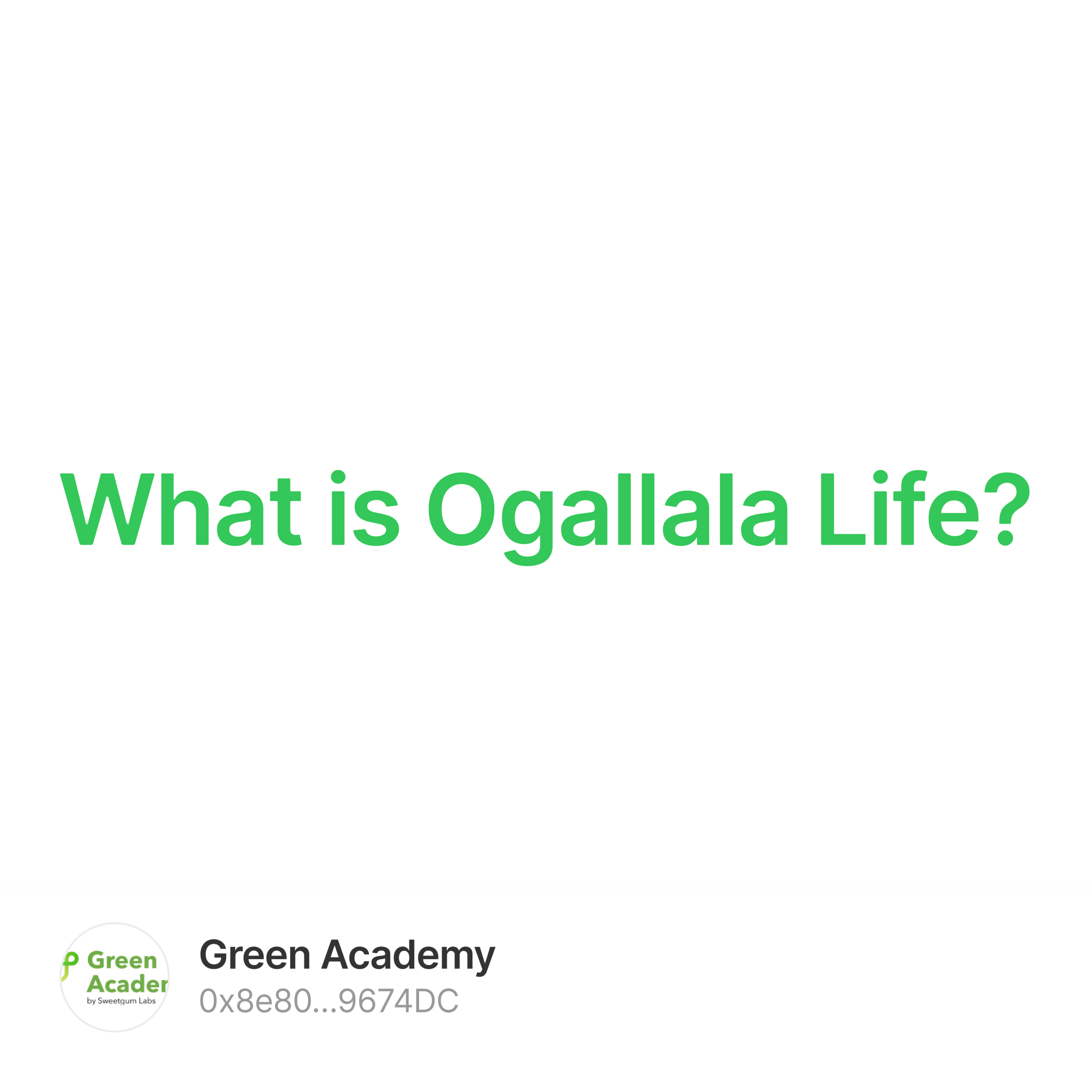Section: ReFi, Blockchain, NFT, bridge ReFi to IRL
Token listing on: Not yet listed
Token name: NA
Blockchain: Cross-Chain
Background
One-third of all the groundwater used for irrigation in the US is mined from the US High Plains Aquifer System (major aquifer - Ogallala), sustaining one-fifth of the US' total beef, corn, cotton, and wheat production. Some sources suggest one-sixth of the world's grain in the US is grown here. Water tables have declined hundreds of feet. 95% or more of our streams and springs are dry. There is no intact prairie biome. Our rivers and watersheds are dry gullies subject to intermittent flash flooding, and little effort is given to recharge or retain water in the ground.
This is largely driven by fundamental failures inherent to our legal system, a mixed inheritance of the British, Spanish, and Roman empires. In Texas, surface water belongs to the state but can be used for multiple purposes. Groundwater is a real property interest, can be severed from the surface, and is considered a commodity once produced (pumped from a well). The law concerning groundwater, the rule of capture, is based on sound imperial policy – to encourage resource exploitation. Federal policy is a little better. Decades of subsidies, fed-backed loans, and insurance have intensified agriculture, and more than 90% of the groundwater pumped from this region is for irrigation.
Legacy institutions built on nation-state concepts lack mechanisms to respond to changing climate and to manage resources like groundwater, much less achieve sustainable development and resilient communities. This led to the formation of Ogallala Life, a nonprofit organization driven by a mission to use, develop and deploy web3 tools for watersheds, wetlands restoration, and landscape rehydration. Their focus area is the US high plains aquifer system consisting of Ogallala and various minor aquifers, ie, Dockum. The system is immense, stretching over 170k sq miles, underlying eight states and a fourth of all US farmland.
Defi potential for the public good
Ogallala's plan is to form a sustainable, perpetual, crowdfunded endowment to fund ecological contracts related to watersheds, wetlands, and retention and help subsidize and direct a more comprehensive, functional payment for ecosystem services (PES) marketplaces than is offered in traditional carbon contracting models.
The project is working towards new governance and sustainable funding models. In the meantime, the continued ability to work relies on the goodwill, the love of the public, supporters, and funding from GitCoin and the like (thank you!).
ReFi to value natural capital
Ogallala envisions using regenerative decentralized finance tools to achieve better, more functional PES marketplaces, frameworks for sustainable and impact bonds, small-scale distributed infrastructure, and more.
Regen Network Development – the team at Ogallala Life, submitted a methodology concept note focusing on watersheds and wetlands function in semi-arid and drylands. Fundamentally, the concept is simple – pay the land user to treat watersheds like watersheds, wetlands like wetlands. Today, most of these critical areas are drained, grazed, and farmed.
Dmeter4dMRV – a founding organization to dMeter, a coalition, and DAO-to-be with a mission to build dMRV. The founding group voted to build and develop dMRV using Ogallala Life pilot projects in the Texas panhandle, the project director Will Masters is a domain specialist. Fellow collaborators include Avano, Astral, Kollectivo, Athena, Shamba, Silvi, and more.
Messaging, Community Building, Advocacy
The mission of Ogallala Life necessitates community building and engagement – bridging web3 and global interests to local communities, many rural and dependent on intensive ag and/or extractive industry (oil and gas).
The project needs locally relevant demonstrations of regenerative projects to research and demonstrate the effect that various actions, practices, and interventions have on representative landscapes. The team has scoped, reviewed, and assessed 2-3 sites of approximately 500 acres total for the first "cohort" of pilots in the focus area.
The project also intends to begin work, focusing on capacity, by year's end. This work will be conducted in collaboration with dMeter and participatory organizations like Silvi (forestation project). Near-term pilots include sand and subsurface dams, check dam cascade, riparian vegetation, road water harvest, and repurposing old sedimented "conservation" dams.
Closing Statement
Ogallala Life would not exist without the energy, optimism, and passion of undergraduate students associated with the Buff Sustainability Team headed by Matt Loftin, professor of business @WTAMU. The Buff Sustainability Team competes in an annual business case competition, aligned with sustainable development goals, called Enactus+, and made it to finals last year, discussing, in large part, their work and contributions to Ogallala Life. We hope to have more concrete successes to present by the end of this year and grow our education and academic engagement efforts.
Web3 can "solve" water security, and Ogallala Life intends to demonstrate just that here on the US High Plains Aquifer System. Please support the Ogallala community, DeFi, ReFi, and locals to make that happen. You can find their Gitcoin Grant link at: https://gitcoin.co/grants/5037/ogallala-life
**
**
